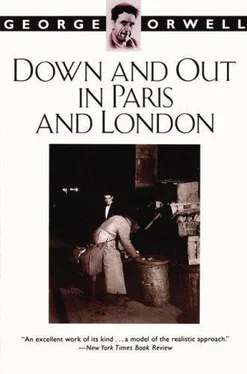George Orwell - Down and Out in Paris and London
Здесь есть возможность читать онлайн «George Orwell - Down and Out in Paris and London» весь текст электронной книги совершенно бесплатно (целиком полную версию без сокращений). В некоторых случаях можно слушать аудио, скачать через торрент в формате fb2 и присутствует краткое содержание. Жанр: Старинная литература, на русском языке. Описание произведения, (предисловие) а так же отзывы посетителей доступны на портале библиотеки ЛибКат.
- Название:Down and Out in Paris and London
- Автор:
- Жанр:
- Год:неизвестен
- ISBN:нет данных
- Рейтинг книги:5 / 5. Голосов: 1
-
Избранное:Добавить в избранное
- Отзывы:
-
Ваша оценка:
- 100
- 1
- 2
- 3
- 4
- 5
Down and Out in Paris and London: краткое содержание, описание и аннотация
Предлагаем к чтению аннотацию, описание, краткое содержание или предисловие (зависит от того, что написал сам автор книги «Down and Out in Paris and London»). Если вы не нашли необходимую информацию о книге — напишите в комментариях, мы постараемся отыскать её.
Down and Out in Paris and London — читать онлайн бесплатно полную книгу (весь текст) целиком
Ниже представлен текст книги, разбитый по страницам. Система сохранения места последней прочитанной страницы, позволяет с удобством читать онлайн бесплатно книгу «Down and Out in Paris and London», без необходимости каждый раз заново искать на чём Вы остановились. Поставьте закладку, и сможете в любой момент перейти на страницу, на которой закончили чтение.
Интервал:
Закладка:
daylight till two o'clock, when the sun was hot and the
town black with people and cars.
After my first week at the hotel I always spent the
afternoon interval in sleeping, or, when I had money,
in a
bistro . Except for a few ambitious waiters who went
to English classes, the whole staff wasted their leisure in
this way; one seemed too lazy after the morning's work
to do anything better. Sometimes half a dozen
plongeurs
would make up a party and go to an abominable brothel
in the Rue de Sieyès, where the charge was only five
francs twenty-five centimes-tenpence half-penny. It was
nicknamed «
le prix fixe , » and they used to describe
their experiences there as a great joke. It was a favourite
rendezvous of hotel workers. The
plongeurs' wages did
not allow them to marry, and no doubt work in the
basement does not encourage fastidious feelings.
For another four hours one was in the cellars, and
then one emerged, sweating, into the cool street. It was
lamplight-that strange purplish gleam of the Paris lamps-
and beyond the river the Eiffel Tower flashed from top
to bottom with zigzag skysigns, like enormous snakes of
fire. Streams of cars glided silently to and fro, and
women, exquisite-looking in the dim light, strolled up
and down the arcade. Sometimes a woman would glance
at Boris or me, and then, noticing our greasy clothes,
look hastily away again. One fought another battle in the
Metro and was home by ten. Generally from ten to
midnight I went to a little
bistro in our street, an
underground place frequented by Arab navvies. It was a
bad place for fights, and I sometimes saw bottles thrown,
once with fearful effect, but as a rule the Arabs fought
among themselves and let Christians alone. Raki, the
Arab drink, was very cheap, and the bistro was open at
all hours, for the Arabs-lucky men-had the power of
working all day and drinking all night.
It was the typical life of a
plongeur , and it did not
seem a bad life at the time. I had no sensation of
poverty, for even after paying my rent and setting aside
enough for tobacco and journeys and my food on
Sundays, I still had four francs a day for drinks, and four
francs was wealth. There was-it is hard to express it-a
sort of heavy contentment, the contentment a well-fed
beast might feel, in a life which had become so simple.
For nothing could be simpler than the life of a
plongeur .
He lives in a rhythm between work and sleep, without
time to think, hardly conscious of the exterior world; his
Paris has shrunk to the hotel, the Metro, a few bistros
and his bed. If he goes afield, it is only a few streets
away, on a trip with some servantgirl who sits on his
knee swallowing oysters and beer. On his free day he
lies in bed till noon, puts on a clean shirt, throws dice for
drinks, and after lunch goes back to bed again. Nothing
is quite real to him but the
boulot , drinks and sleep; and
of these sleep is the most important.
One night, in the small hours, there was a murder just
beneath my window. I was woken by a fearful uproar,
and, going to the window, saw a man lying flat on the
stones below; I could see the murderers, three of them,
flitting away at the end of the street. Some of us went
down and found that the man was quite dead, his skull
cracked with a piece of lead piping. I remember the
colour of his blood, curiously purple, like wine; it was
still on the cobbles when I came home that evening, and
they said the schoolchildren had come from miles round
to see it. But the thing that strikes me in looking back is
that I was in bed and asleep within three minutes of the
murder. So were most of the people in the street; we just
made sure that the man was done for, and went straight
back to bed. We were working people, and where was
the sense of wasting sleep over a murder?
Work in the hotel taught me the true value of sleep,
just as being hungry had taught me the true value of
food. Sleep had ceased to be a mere physical necessity; it
was something voluptuous, a debauch more than a relief.
I had no more trouble with the bugs. Mario had told me
of a sure remedy for them, namely pepper, strewed thick
over the bedclothes. It made me sneeze, but the bugs all
hated it, and emigrated to other rooms.
XVII
WITH thirty francs a week to spend on drinks I could
take part in the social life of the quarter. We had some
jolly evenings, on Saturdays, in the little bistro at the foot
of the Hôtel des Trois Moineaux.
The brick-floored room, fifteen feet square, was
packed with twenty people, and the air dim with smoke.
The noise was deafening, for everyone was either talking
at the top of his voice or singing. Sometimes it was just a
confused din of voices; sometimes everyone would burst
out together in the same songthe " Marseillaise, » or the
" Internationale, » or " Madelon," or " Les Fraises et les
Framboises. » Azaya, a great clumping peasant girl who
worked fourteen hours a day in a glass factory, sang a
song about, "
Il a perdu ses pantalons, tout en dansant le
Charleston
." Her friend Marinette, a thin, dark Corsican
girl of obstinate virtue, tied her knees together and
danced the
danse du ventre . The old Rougiers wandered
in and out, cadging drinks and trying to tell a long,
involved story about someone who had once cheated
them over a bedstead. R., cadaverous and silent, sat in
his corner quietly boozing. Charlie, drunk, half danced,
half staggered to and fro with a glass of sham absinthe
balanced in one fat hand, pinching the women's breasts
and declaiming poetry. People played darts and diced
for drinks. Manuel, a Spaniard, dragged the girls to the
bar and shook the dice-box against their bellies, for
luck. Madame F. stood at the bar rapidly pouring
chopines
of wine through the pewter funnel, with a wet
dishcloth always handy, because every man in the room
tried to make love to her. Two children, bastards of big
Louis the bricklayer, sat in a corner sharing a glass of
sirop
. Everyone was very happy, overwhelmingly
certain that the world was a good place and we a notable
set of people.
For an hour the noise scarcely slackened. Then about
midnight there was a piercing shout of «
Citoyens ! » and
the sound of a chair falling over. A blond, red-faced
workman had risen to his feet and was banging a bottle
on the table. Everyone stopped singing; the word went
round, "Sh! Furex is starting!" Furex was a strange
creature, a Limousin stonemason who worked steadily
all the week and drank himself into a kind of paroxysm
on Saturdays. He had lost his memory and could not
remember anything before the war, and he would have
gone to pieces through drink if Madame F. had not taken
care of him. On Saturday evenings at about five o'clock
she would say to someone, "Catch Furex before he
spends his wages," and when he had been caught she
would take away his money, leaving him enough for one
good drink. One week he escaped, and, rolling blind
drunk in the Place Monge, was run over by a car and
badly hurt.
The queer thing about Furex was that, though he was
Читать дальшеИнтервал:
Закладка:
Похожие книги на «Down and Out in Paris and London»
Представляем Вашему вниманию похожие книги на «Down and Out in Paris and London» списком для выбора. Мы отобрали схожую по названию и смыслу литературу в надежде предоставить читателям больше вариантов отыскать новые, интересные, ещё непрочитанные произведения.
Обсуждение, отзывы о книге «Down and Out in Paris and London» и просто собственные мнения читателей. Оставьте ваши комментарии, напишите, что Вы думаете о произведении, его смысле или главных героях. Укажите что конкретно понравилось, а что нет, и почему Вы так считаете.












